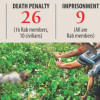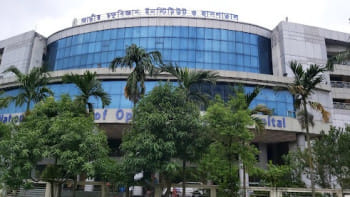Crime and compensation

Following the verdict of the widely discussed Narayanganj seven-murder case, Dr Shahdeen Malik, a renowned jurist, proposed that our government initiate the practice of giving monetary compensation to victims of grievous injuries and to the families of victims of murder or manslaughter. He referred to the examples of developed countries that have already started this practice half a century ago.
He also brought in the example of India, for taking the initiative to incorporate monetary compensation in section 357 of their Code of Criminal Procedure. Dr Malik opined that even if the government cannot compensate all the victims of crimes at present, the Narayanganj seven-murder case can pioneer the concept of awarding financial compensation to the victims or their families.
One of the five types of penalties under section 53 of the Penal Code, 1860 is that of fine, which has also been merged with the other provisions of punishment for all offenses defined in this Act, including imprisonment, imprisonment for life, or death penalty. However, the amount of fine has not been specified and has been left to the discretion of judges. The fine sentenced is usually small and is submitted to the public exchequer after collection. The victims or the families of the victims are thus, often, deprived from compensation.
The practice of awarding monetary compensation to victims or their families is not absolutely foreign to our laws. In fact, section 15 of the Prevention of Repression of Women and Children Act, 2000 states that the, "tribunal may consider the fine if they think that it is necessary, which is imposed for the offences under sections 4 to 14 of this Act, as damages for the victim of the offence and in case, where the fine cannot be realised from the convict or from his existing property, it can be realised from the property of which he will be the owner or in possession in future and the claim of such fine or damage shall prevail over any other claim on that property."
Additionally, section 13 of the same Act lays down the provision regarding a child born as a consequence of rape. Under the section, the state is responsible for providing maintenance of a child born as a result of rape. To do this, the government primarily collects maintenance costs from the rapist's estate. However, if it is not possible, the government shall provide the maintenance costs from the state's fund.
The government does so from the concept of a welfare state. From this view point, it can be argued that it is the government's responsibility to compensate the victims of crimes as they have previously failed to protect them. To do so, the state may primarily collect compensation from the criminal and upon any failure to do so, owing to the financial condition of the said criminal, it may provide compensation from the state's own funds.
Another instance of provisions facilitating monetary compensation is Section 138 of the Negotiable Instruments Act, 1881, which allows the court to collect a fine thrice the amount of the dishonoured cheque. The practice of disbursing the claim of the creditor from this fine is common in Bangladeshi courts. Besides, Section 1 of the Fatal Accidents Act, 1855 states, whenever the death of a person shall be caused by wrongful act, neglect or default, the family or his financial dependents can claim financial compensation in court and the court may give such damages as it may think proportioned to the loss resulting from such death to the parties, respectively.
Section 27 of the Anti-Corruption Commission Act, 2004 provides that the court can confiscate the illegally gained properties in addition to sentencing the corrupt individuals. Confiscation of properties should also be incorporated in other legislations to compensate the respective victims of the offences defined under different legislations.
It is a common misconception that a state's responsibility is fulfilled upon the delivery of judgment in a case. This is far from true, as the true end of a state is to ensure justice, which may not be accomplished until the victim's status is restored. Hence, compensating the victims for crimes committed against them also falls within the government's duties. For example, if the victim of a murder was the sole breadwinner of the family, mere punishment for the criminal does not end the family's suffering. Rather, their financial struggle increases in the aftermath.
The financial struggles of the families of the victims or his/her immediate dependants can be minimised if the government compensates them from the collected fines. Jeremy Bentham also emphasised on the need for financial compensation of the sufferer, stating that "satisfaction" should be collected from the perpetrator's assets, but if the perpetrator has no asset it should be given from the public treasury for public good.
While deciding the amount of the compensation, the court should take into account multiple factors, like the pain and suffering of the victim, medical expenses, damage to property, and his absence from the workforce or whether he was unable to find employment. In cases where the victim dies, the court should take into account the dependency of the family on the victim's income, the age of the victim and qualifications, etc.
According to the principle of strict liability, the state is responsible for the safety and wellbeing of its citizens, and thus, any harm to them is a failure on the part of the state and indicates that the state has broken the implied social contract with the citizens, wherein the state collects tax in exchange for providing protection to body and property. Hence, the victims of crime and their families or dependents are entitled to claim compensation, similar to the civil law circumstances where a party can claim remedies for violation of a contract. The provision for monetary compensation is essential to the establishment of restorative justice in the criminal justice system of the country and, hence, should be considered carefully.
Md Shahnewaj Patwari is Advocate, Dhaka Judge Court and Research Officer (Law) at Bangladesh Institute of Law and International Affairs (BILIA).
E-mail: [email protected]










Comments